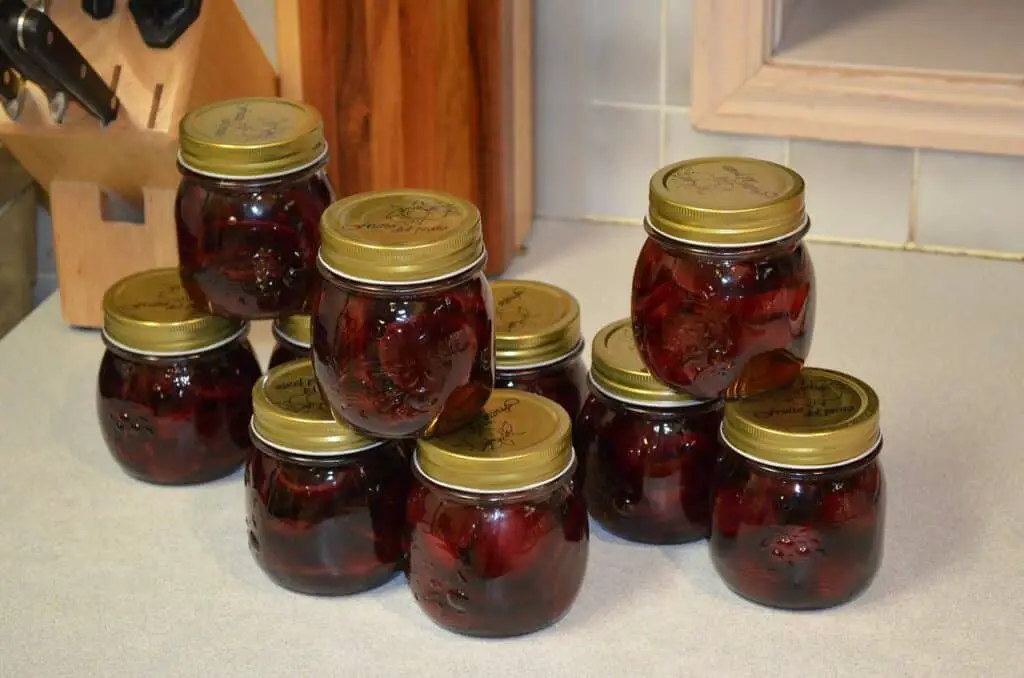Fresh beets add a decadent earthy flavor to salads, juices, and foods titillating those taste buds with each bite.
Beets are most likely their favorite veggie if your pup is a sweet tooth.
So, if you’ve bought some canned beets ready to prepare an aromatic dish, and your pup follows you in the kitchen, obviously wanting some.
How generous do you get?
Is it even safe for canines to start with?
So, can dogs eat canned beets?
Well, it depends; although nontoxic, canned beets are not suitable nor healthy for canines.
They contain increased salts, preservatives, and other additives that can hurt your dog.
Additionally, canned beets are highly processed and thus, lacking in nutritional value.
On the contrary, beets in their natural form offer dense nutritional benefits to canines like fiber, minerals, and vitamins for proper body functioning.
Canines can literary enjoy anything they find without much concern.
Does that mean we can feed them anything?
Find out about canned beets and dogs in the article.

What are the nutritional benefits of feeding your dog beets?
Any additional foods outside your dog’s diet should be fed in moderation.
Beets in the natural state offer a nutritional boost to your dog’s health like improved immune and digestive system, among other benefits.
Rich in vitamins
Beets contain vitamin B9, essential for regulating blood sugar levels and supporting the digestion of proteins and amino acids.
Natural beets also contain vitamin E, which helps keep your dog’s coat shiny and healthy.
Dietary fiber
Beets are loaded with fiber that helps improve bowel movement, relieving canine constipation and flatulence.
Fiber also creates a sense of fullness, thus, regulating food portions and leading to weight management.
Similarly, dietary fiber nourishes gut-friendly bacteria, reducing your dog’s risk of digestive issues.
Loaded with antioxidants
Beets contain Vitamin C, which has increased antioxidants that boost your dog’s immunity by averting the oxidative damage to body cells caused by free radicals.
This, in return, helps prevent the prevalence of certain chronic diseases such as cancers and heart disease.
Minerals rich
Beets, especially beet tops, are rich in minerals like calcium that aid in the building and maintaining healthy bones and muscles.
The presence of phosphorus improves your dog’s cognitive functioning.
Manganese and magnesium in beets boost nerve function, while zinc boosts the overall immune system.

What are the health concerns of feeding your dog canned beets?
All-natural beets in moderated quantities are healthy for canines.
Canned beets, on the other hand, contain salts, preservatives, and additives unsuitable for your dog’s health.
The following concerns are worth considering when it comes to dogs and canned beets:
High sugar content
Commercially canned beets contain added sugars like syrup for palatability which is a health hazard for your dog if consumed in large quantities.
These sugars are complex for your dog’s digestive system to process, risking obesity, diabetes, and dental problems.
High salt content
The level of sodium is high in processed foods compared to fresh vegetables.
This increases the chances of your dog developing diabetes and gastrointestinal disorders if consumed often.
Store-bought canned beets, popular among households, are loaded with sodium-based preservatives like nitrates and nitrites.
Symptoms of high salt intake in dogs
- Vomiting
- Diarrhea
- Lethargy
- Abnormal fluid accumulation
- Kidney damage
- Seizures or coma
Oxalate
Beets contain oxalate, which in large amounts leads to bladder stones.
This condition may be worse for dogs with pancreatitis or other underlying chronic ailments.
Artificial preservatives
Canned beets contain additives like nitrates, parabens, BHT, and BHA, which can cause serious health damage to your dog’s organs.
These artificial preservatives can lead to allergies, hypersensitivity, and cancer.
If you want to feed your furry friend beets, give them the naturally cooked beets.
How to safely feed your dog beets?
Beets are a healthy occasional dog snack depending on how they are prepared.
- Cooked beets: Steaming or boiling is the best and safest way to prepare beets for canines. These methods soften the veggie making it easier for your pup to chew, break down and digest. Steaming retains most nutrients compared to boiling; the choice is yours. Don’t add any ingredients harmful to canines—plain is always better.
- Raw: Beets are nutrient-dense in their raw state; however, they may cause choking or digestive issues for small pups with sensitive stomachs. Cut beets into bite-size pieces to ease chewing and avoid risks of digestive blockages.
- Pickled beets: We know pickled is the all-time favorite for beet lovers. Unfortunately, it’s not the same for our furry friends. Pickled beets are preserved in salt brines—salt is a health danger for canines.
- Canned: Not recommended for dogs due to the high salt, additives, and preservatives. Sodium poisoning can be fatal for dogs which is not a worthy risk.
- Beet juice: Blending beets into juice is an excellent way to savor the nutrients. It’s not safe for dogs due to the sugar concentration. Too much juice can cause weight gain, dental problems, and elevated blood sugar levels.
- Beet pulp: This is a great way to feed your canines in moderated amounts.
How many canned beets are enough for my dog?
While all-natural beets are a healthy snack, canned beets should only be given to your dog in moderation.
A half-cup of canned beets once or twice a week is the general rule of thumb for feeding dogs this vegetable.
This rule is based on the following factors:
The overall health of your dog
If your furry friend is suffering from any chronic ailment, it’s best to check with the vet before adding beets to their diet.
Age
Puppies and senior dogs are more susceptible to developing health problems from canned beets.
Their digestive and immune systems are not as strong as adult dogs.
Size
Small breeds can’t handle large portions of food.
Moreover, their stomachs are more sensitive to processed foods like canned beets.
It’s best to give them a few spoonfuls and see how they react before increasing the portion size.
The bottom line
The aroma of beets is just on another level to even resist sharing with your pup.
Adding the nutritional profile makes it a worse temptation even when you know it’s bad for your pup.
Unfortunately, canned versions have additives and high sodium levels harmful to your dog’s health.
The good news is that you can share some fresh, plain beets with your favorite four-legged pal.
Shred on their kibble, and watch them enjoy the rich flavors.
- What Dog Breeds Have Pink Skin? - March 24, 2023
- What Are the Most Inspiring Dog Breeding Quotes? - March 20, 2023
- Can Pheromone Spray Help Improve Dog Breeding Results? - March 19, 2023








